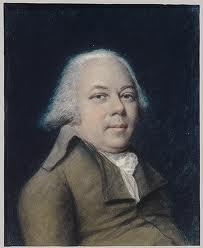Difference between revisions of "Médéric Louis Élie Moreau de Saint-Méry: The "unnatural pleasures" of American women, 1793-1798"
From OutHistory
Jump to navigationJump to search (New page: A French lawyer and politician, Médéric Louis Élie Moreau de Saint-Méry, lived in America from 1793 to 1798, most of the time in Philadelphia. His brief comment is one of the earliest ...) |
|||
| (One intermediate revision by the same user not shown) | |||
| Line 1: | Line 1: | ||
| − | A French lawyer and politician, Médéric Louis Élie Moreau de Saint-Méry, lived in America from 1793 to 1798, most of the time in Philadelphia. His brief comment is one of the earliest known observations concerning sex between women | + | A French lawyer and politician, Médéric Louis Élie Moreau de Saint-Méry, lived in America from 1793 to 1798, most of the time in Philadelphia. His brief comment is one of the earliest known observations in this country concerning women masturbating ("the enjoyment of themselves") and sex between women, and not surprisingly it also involves a negative moral judgment. |
| − | "Although in general one is conscious of widespread modesty in Philadelphia," says | + | Painting by James Sharples of Saint-Méry |
| + | [[Image:Saint Mery.jpeg|left]] | ||
| + | |||
| + | |||
| + | |||
| + | |||
| + | |||
| + | |||
| + | |||
| + | |||
| + | |||
| + | |||
| + | |||
| + | |||
| + | |||
| + | |||
| + | |||
| + | |||
| + | |||
| + | |||
| + | |||
| + | |||
| + | |||
| + | |||
| + | "Although in general one is conscious of widespread modesty in Philadelphia," says Saint-Méry, | ||
| − | |||
:the customs are not particularly pure, and the disregard on the part of some parents for the manner in which their daughters form relationships to which they, the parents, have not given their approval is an encouragement of indiscretions which, however, are not the result of love, since American women are not affectionate. | :the customs are not particularly pure, and the disregard on the part of some parents for the manner in which their daughters form relationships to which they, the parents, have not given their approval is an encouragement of indiscretions which, however, are not the result of love, since American women are not affectionate. | ||
| − | + | Saint-Méry later adds: | |
| − | :I am going to say something that is almost unbelievable. These women, without real love and without | + | :I am going to say something that is almost unbelievable. These women, without real love and without passions, give themselves up at an early age to the enjoyment of themselves; and they are not at all strangers to being willing to seek unnatural pleasures with persons of their own sex.<ref>Reprinted in {{GAH}}, pages 25-26 from Médéric Louis Élie Moreau de Saint-Méry, ''Saint-Méry's American Journey'', trans and ed. by Kenneth Roberts and Anna M. Roberds (Garden City, N.Y.: Doubleday, 1947), page 284, 286.</ref> |
=Notes= | =Notes= | ||
<references/> | <references/> | ||
| + | |||
| + | <comments /> | ||
Latest revision as of 16:23, 15 February 2011
A French lawyer and politician, Médéric Louis Élie Moreau de Saint-Méry, lived in America from 1793 to 1798, most of the time in Philadelphia. His brief comment is one of the earliest known observations in this country concerning women masturbating ("the enjoyment of themselves") and sex between women, and not surprisingly it also involves a negative moral judgment.
Painting by James Sharples of Saint-Méry
"Although in general one is conscious of widespread modesty in Philadelphia," says Saint-Méry,
- the customs are not particularly pure, and the disregard on the part of some parents for the manner in which their daughters form relationships to which they, the parents, have not given their approval is an encouragement of indiscretions which, however, are not the result of love, since American women are not affectionate.
Saint-Méry later adds:
- I am going to say something that is almost unbelievable. These women, without real love and without passions, give themselves up at an early age to the enjoyment of themselves; and they are not at all strangers to being willing to seek unnatural pleasures with persons of their own sex.[1]
Notes
- ↑ Reprinted in Jonathan Ned Katz, Gay American History: Lesbians and Gay Men in the U.S.A. (NY: Crowell, 1976), pages 25-26 from Médéric Louis Élie Moreau de Saint-Méry, Saint-Méry's American Journey, trans and ed. by Kenneth Roberts and Anna M. Roberds (Garden City, N.Y.: Doubleday, 1947), page 284, 286.
<comments />
